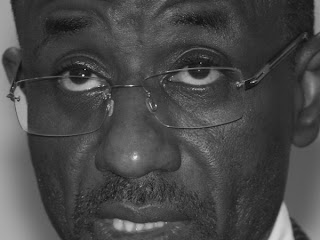
By Ruona Agbroko
August 15, 2009 09:16AMT
It has been a tumultuous day for Nigeria’s financial sector. In the early hours of Friday August 14, news started trickling in that CEOs were to be sacked in five of Nigeria’s most badly managed banks; a first in the history of the nation’s banking history. By 11am, sources in the sector confirmed to NEXT that Sanusi Lamido Sanusi [pictured], the governor of the Central Bank of Nigeria had sacked CEOs and Executive Directors of Oceanic Bank, Afribank, Intercontinental Bank, Union Bank and Finbank.The banks apparently accounted for 40.81% of the sector’s total non-performing loans.As thousands of shareholders panicked, the markets reported dropping share prices for the five banks; the Naira plunged by two points to ₦159 against the dollar.Rising from a closed-door meeting with all chief executives of the nation’s 24 banks, Mr. Sanusi explained the basis for what has so far been the most definitive move in history to reverse “a general weakness in risk management and corporate governance” in Nigerian banks.According to Mr. Sanusi the ailing banks accounted for a “disproportionate component” of the industry’s total exposure to the capital market and oil and gas sectors. He said, “the total loan portfolio of these five banks was ₦2,801.92 billion; margin loans amounted to ₦456.28 billion and exposure to oil and gas was ₦487.02 billion.” Mr. Sanusi also confirmed that the banks “were either perennial net-takers of funds in the inter-bank market or enjoyed liquidity support from the CBN for long periods of time, a clear evidence of illiquidity.”
Taking over
For what he termed acting “in a manner detrimental to the interest of their depositors and creditors,” Mr. Sanusi announced the immediate sacking of the bank’s CEOs. He followed up with an announcement on their CBN-appointed replacements. They are: Nebolisah Arah to replace Sebastian Adigwe in Afribank Nigeria Plc., Susan Iroche replaces Okey Nwosu at Finbank Plc., Funke Osibodu replaces Bathlomew Ebong at Union Bank of Nigeria Plc. At Intercontinental Bank Plc, Lai Alabi takes over from Erastus Akingbola, while John Aboh replaces Cecelia Ibru, at Oceanic International Bank Plc.
Crunch Time
The CBN governor admitted that a change in management alone would not resolve the problems of the banking sector. He therefore announced an injection of ₦400bn into the five banks. He however said this is only an interim measure and that the government has no intention of becoming a long term shareholder in the banks and will step aside as soon as investors are found for the banks.He also issued a warning: “We will also ensure that officers of banks and debtors who contribute to bank failures are brought to book to the full extent of the law and that all proceeds of infraction are confiscated when legally feasible.”Mr. Sanusi also declared a September 30 deadline for all banks to effect full disclosure of non-performing loans. The special stress audit conducted on the five banks has now been widened to cover all of Nigeria’s 24 banks. The audit is scheduled to be completed on the remaining 11 banks by the CBN at the end of August.
Ripple effect
There is anxiety among ordinary Nigerians on what these developments portend for the sector. Despite Mr. Sanusi’s assurance that the government will not allow any Nigerian bank to fail, shareholders have voiced their concern over the fate of their investments.This situation has not been helped by Mr. Sanusi’s remarks that one of the five banks “is technically insolvent, with a Capital Adequacy Ratio of 1.01 per cent.”Many who called NEXT were undecided about whether to sell off their shares now or wait for the outcome of the CBN’s directives, even as industry insiders have asked shareholders to stop listening to and spreading rumours.
Speaking to NEXT, Boniface Okezie, the president of the Progressive Shareholders Association of Nigeria (PSAN) however said; “It is too early for shareholders to start panicking because the CBN has not announced that those banks have stopped meeting their obligations to depositors.”
A top official of Guaranty Trust Bank Plc, one of the first banks to undergo the stress audit, confirmed to NEXT that the mood in the industry is one of uncertainty.“Presently, there are rumours that more banks are going down. There are rumours that more MDs will be placed on suspension. There is so much confusion. Though this is more of an incentive for the healthy banks to remain focused on prudently managing depositors’ funds, people are afraid, and we are wondering how this widespread panic from depositors will affect the industry in the long term.”
A female reader, “Lola”, called NEXT saying, “I have 5million units of shares in Oceanic, 1 million in Afribank; and 500,000 units in Intercontinental Bank, and right now I am confused about what to do because I didn’t see this coming. I bought the shares about two-three years ago during the capital market boom; I don’t know if it is too late to do anything about them now.”
*Photo by NEXT
*Photo by NEXT
No comments:
Post a Comment